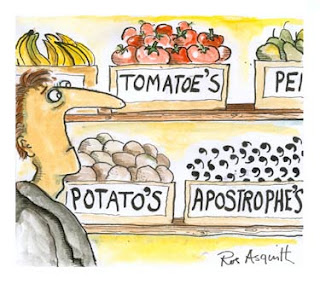But what about plurals of words made up of initial letters, like “GCSE” or “CEO”? (Incidentally, these should – strictly speaking – be referred to as initialisms, rather than acronyms – see explanation below)*. Does the same rule still apply?
I think it does, but perhaps not so strongly. A reference to “CD’s” or “MP’s” may not stand out so clearly as being wrong as “tomato’s”, but the apostrophe is still unnecessary – the lower case “s” is on its own enough to denote the plural. The Economist’s online style guide, in its section on acronyms, recommends using a regular lower-case “s”, with no apostrophe in sight. The same – and here The Economist is explicit – holds true for decades, so it is “the 1990s”, not “the 1990’s”.
Things get a little more complicated when it comes to plurals of single letters. Here the authorities do not agree. The Times style guide advises that “an apostrophe should be used to indicate the plural of single letters - p's and q's”**. This is presumably to avoid confusion with two-letter words (or initialisms) ending in "s", like "ps", "as" or "is",
But, although a recent Sunday Times feature followed this format, a Times column earlier this month referred to “Ps and Qs”. A similar discrepancy can be found between a recent article from the Daily Mail (“Ps and Qs”) and one from its sister paper, the Mail on Sunday (“p’s and q’s”). This suggests that with plurals of single letters, either format will do – upper case letters with no apostrophe, or lower case letters with an apostrophe.
(Picture from a Walk in the WoRds)










Merriam-Webster's Dictionary of English Usage and the Oxford Companion to the English Language tell us that the apostrophe of plurality is still a standard option with letters, numbers, abbreviations, and symbols.
ReplyDeleteThanks goofy - I admit that there still isn't one commonly accepted standard. I hadn't seen the Oxford Companion to the English Language which is clearly a gap in my reading.
ReplyDeleteIn terms of usage, at least in print, there seems to be a shift away from using apostrophes in plurals of abbreviations and numbers. Similarly I think there has been a shift away from full stops after each letter in initialisms - I know I used to write "G.C.S.E." but now I write "GCSE".
For me, there is no clear reason to include apostrophes of plurality - they don't help clarity, except possibly in plurals of single letters, and they can look "wrong" to readers who associate them with the "grocer's apostrophe".